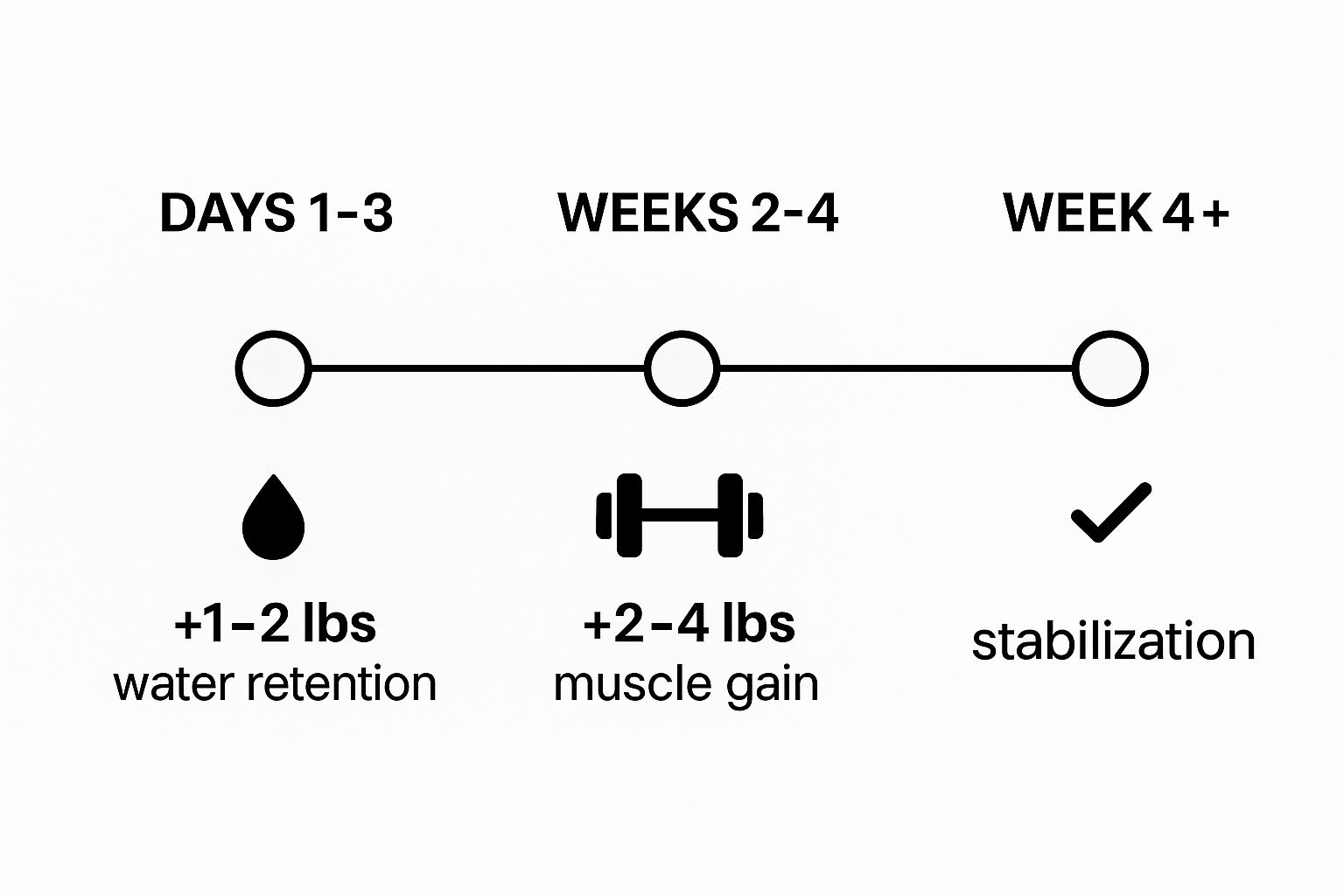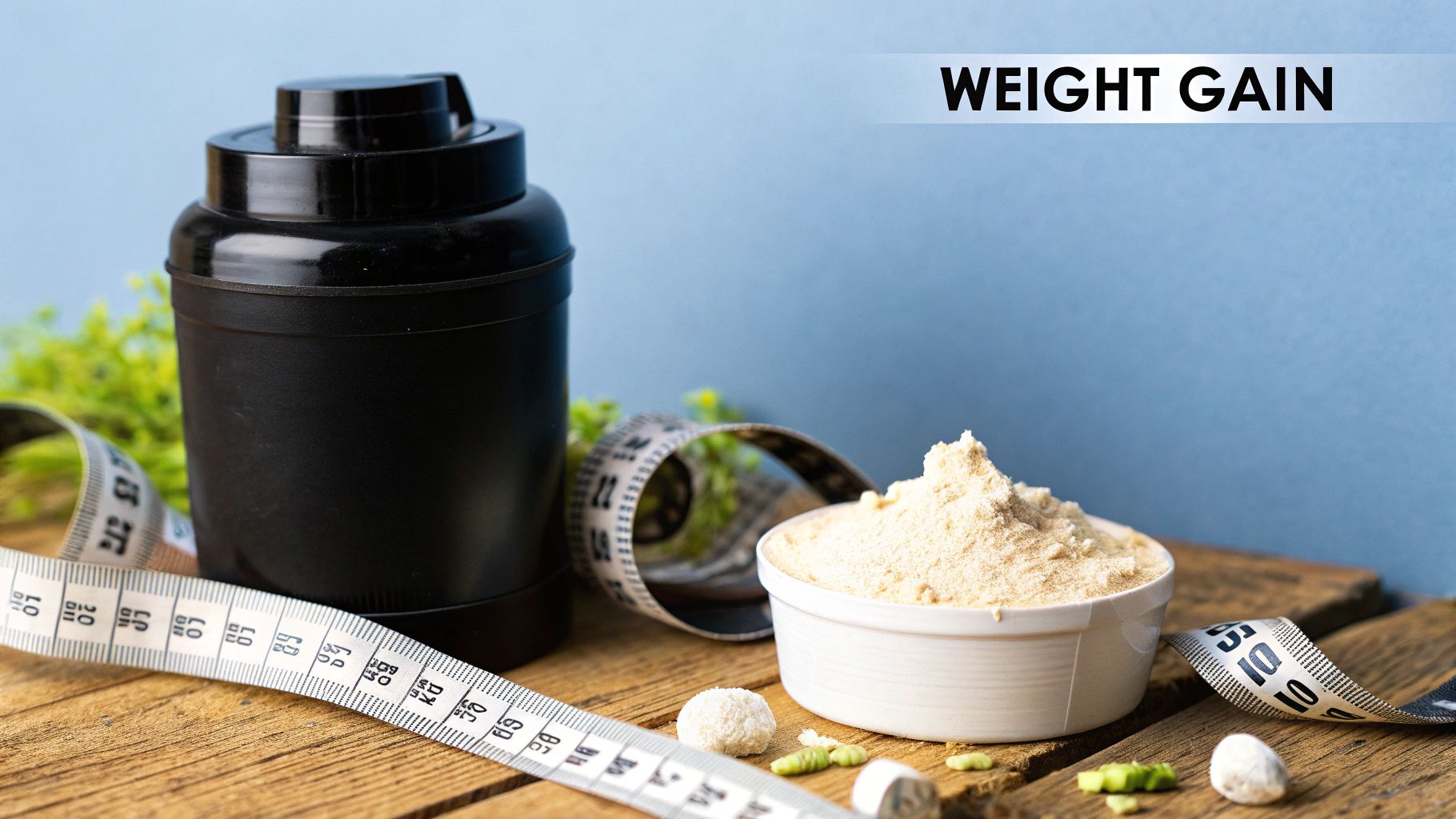
How Much Weight Gain from Creatine Is Normal?
Share
If you've just started taking creatine, you've probably noticed the number on the scale jump up. Don't panic—this is completely normal. Most people see a quick increase of 2-6 pounds (around 1-3 kg) within the first week or two.
This initial gain isn't fat. It’s almost entirely water. Creatine works by pulling water into your muscle cells, a process called cellular hydration. Think of it as a great sign—it means the supplement is doing its job and your muscles are getting "super-hydrated" and primed for serious work.
What to Expect on the Scale Your First Month
Seeing the scale tick upward can be a little jarring, especially when you're working hard. But it's crucial to understand what's happening behind the scenes during that first month. This initial bump in weight is a predictable and necessary part of the process.
It means your muscles are becoming fully saturated with creatine, creating the perfect environment to push harder in the gym and build real, lasting muscle down the line. This isn't fat gain; it's your body getting ready for growth.
Your Weight Gain Timeline
This journey from quick water retention to solid muscle gain follows a pretty typical pattern.

The rapid water weight gain you see in the first week or so eventually levels off, making way for the more gradual, sustainable muscle you’re actually working for.
Here’s a simple breakdown of what that looks like over the first few months.
Typical Creatine Weight Gain Timeline
| Timeframe | Expected Weight Gain | Primary Cause |
|---|---|---|
| Week 1 | 2–6 lbs (1–3 kg) | Rapid water retention as muscles saturate. |
| Month 1 | Gain stabilizes, slower increase. | Continued water retention and early muscle adaptation. |
| Month 3+ | 0.5–1 lb per month (variable) | Legitimate muscle mass gains from improved performance. |
This timeline shows how the initial, dramatic jump is temporary, transitioning into the real prize: consistent muscle growth.
To get a clearer picture of your progress, it’s a good idea to use one of the best workout tracking apps. This will help you focus on performance metrics—like lifting heavier or getting more reps—instead of just the number on the scale.
Research backs this up, with studies showing an average gain of around 1.31 kg (about 3 pounds) after a 28-day cycle. If you're interested in accelerating the initial saturation process, you might want to learn about the loading phase for creatine monohydrate.
Why Creatine Makes You Gain Water Weight
So, you've started taking creatine and the number on the scale has ticked up. Where is that extra weight actually coming from? The answer is a simple process called cellular hydration, and it's a fantastic sign that the supplement is doing exactly what it's supposed to do.

Think of your muscle cells like tiny balloons. When you take creatine, it acts like a magnet, pulling water from other parts of your body and drawing it directly inside those muscle cells. This process is called intramuscular water retention, and it literally inflates those "balloons," giving your muscles a fuller, more pumped look.
This is a world away from the uncomfortable bloating you might get under your skin after a salty meal. This is functional water weight, stored right where you want it: inside the muscle tissue itself.
The Science of Muscle Hydration
This extra hydration does a lot more than just make you look bigger. It actually creates a high-performance environment inside your muscles, setting the stage for real growth.
When your muscle cells are properly hydrated, a few key things happen:
- Better Energy Production: Creatine’s main job is to help your muscles recycle ATP, the fuel source for explosive movements. Having more water inside the cell makes this energy-producing cycle run even more efficiently.
- A Signal for Growth: The physical swelling of the muscle cell sends anabolic signals that tell your body it's time to build more muscle tissue—a process known as protein synthesis.
- Less Muscle Breakdown: Being in a hydrated state can also help protect your muscles from the damage and protein breakdown that naturally occurs during tough workouts.
The weight you gain from this is not fat. It’s a strategic increase in cellular fluid that directly supports your ability to get stronger and recover faster.
Ultimately, this initial water gain is the first step toward the results you're after. By super-hydrating your muscles, creatine primes your body for the enhanced performance needed to build real, solid muscle mass in the long run. The scale might go up, but it's reflecting a body that's ready to work.
How Water Weight Translates to Real Muscle
That initial jump you see on the scale after starting creatine? That's almost all water. But don't mistake it for simple bloating—this is where the magic begins.
Think of it this way: creatine super-hydrates your muscle cells, creating the ideal internal environment for growth. It’s like prepping a construction site before the real building starts.

With more water and readily available energy packed directly into your muscles, your performance in the gym gets a serious upgrade. Suddenly, you might find yourself pushing out an extra rep or two on that last heavy set or adding a few more pounds to the bar.
This is the real secret to creatine's effectiveness. It isn't a magic pill that builds muscle on its own. It's a powerful workout enhancer that gives you the fuel to do the hard work.
From Water to Real Gains
The connection here is incredibly direct. Better workouts lead to better muscle growth, a process called hypertrophy.
Creatine helps you push your limits during training. That consistent, harder work is what ultimately signals your body to build solid, lean muscle mass.
The science consistently backs this up. When researchers look at groups combining creatine with resistance training, they see a significant boost in lean muscle. In fact, a major review of studies found this combo adds an average of 1.37 kilograms (around 3 pounds) more lean tissue than just training alone.
So, while the water weight comes first, it's just the catalyst. It supports the intense effort your body needs to adapt, recover, and build the muscle you're training for.
If you want to dive deeper into this process, check out our guide on whether creatine makes you bigger.
What Factors Influence Your Results
Ever wonder why your training partner packed on five pounds in their first week of creatine while you only saw the scale move by two? It's not random. The amount of weight you gain is a direct result of your unique biology and lifestyle.
Your starting point is a huge piece of the puzzle. Think of it like a gas tank—if your muscles are already low on creatine, they have more room to fill up. This is often the case for vegetarians and vegans who don't get creatine from red meat, so they tend to see more dramatic initial shifts.
Key Variables in Creatine Response
Your body size, diet, and how hard you hit the gym also play a major role. A 220-pound lifter simply has more muscle mass to store creatine and water than a 150-pound person, so their weight gain will naturally be higher.
Then there's genetics. Some people are known as "responders," meaning their bodies are incredibly efficient at absorbing and using creatine. On the flip side, some are "non-responders" who see very little effect, though this is pretty rare. Even the specific type of creatine you choose can make a difference. Digging into the differences between monohydrate or micronized creatine can help you dial in your approach.
The weight gain from creatine isn't a one-size-fits-all number. It's a personalized outcome based on your biology, diet, and how hard you train.
Want to make sure you're getting the most out of every scoop? Here are a few simple tips to follow:
- Stay Hydrated: Creatine works by pulling water into your muscles. To help it do its job and stay properly hydrated, you need to be drinking plenty of water all day long.
- Be Consistent: Don't skip days. Taking your daily 3-5 gram dose, even on rest days, is crucial for keeping your muscles fully saturated and ready to perform.
- Pair with Carbs/Protein: You can give creatine a helping hand by taking it with a meal. The insulin spike from carbs and protein helps shuttle it into your muscle cells more effectively.
Finally, the quality of your supplement matters. Sourcing your creatine from reputable, quality supplement sources ensures you're getting a pure product without unwanted fillers. By keeping these factors in mind, you're not just taking creatine—you're making it work for you.
What the Science Actually Says About Creatine and Weight
So, let's cut through the gym-floor chatter and get straight to the science behind creatine and the number on the scale. It's easy to get bogged down in dense research papers, but the core findings are remarkably consistent and, frankly, exactly what you want to hear. The weight you gain is functional mass.

Time and time again, studies show that creatine helps you build lean muscle, not fat. A massive meta-analysis that pooled data from 143 different trials gave us a very clear picture. On average, people taking creatine gained about 0.86 kilograms (nearly 2 pounds) more body mass than those who weren't. If you're a data person, you can read the full research on body composition changes yourself.
It’s All About Quality Weight
Here’s the part that really matters: where did that weight come from?
The same analysis broke it down, finding that 0.82 kilograms of that gain was pure fat-free mass. That means almost every bit of the added weight was lean tissue and the water stored within it—the stuff that builds a stronger, more powerful physique.
The science is definitive: Creatine supplementation is directly linked to an increase in lean muscle mass and has no significant effect on fat accumulation.
This should give you confidence. When you start taking creatine and see the scale tick upward, you can be sure it’s reflecting positive changes inside your body. It's not just random weight; it's quality weight that directly supports your performance and helps you crush your fitness goals.
Common Questions About Creatine Weight Gain
Even with all the science, it's natural to have a few questions swirling around. Let's tackle some of the most common concerns I hear all the time to clear things up and help you start supplementing with confidence.
Will Creatine Make Me Look Fat or Bloated?
This is probably the biggest myth out there, so let's set the record straight. The weight you gain from creatine is intramuscular water, which means the water is pulled directly into your muscle cells. It’s not the same as the subcutaneous water that sits under your skin and can make you look puffy.
Think of it this way: instead of making you look soft, creatine helps your muscles look fuller, harder, and more defined. The number on the scale goes up, but your reflection in the mirror actually looks leaner and more athletic.
Does the Weight Go Away if I Stop Taking It?
Yep, most of it will. If you stop taking creatine, your muscles will gradually release that extra stored water over a few weeks. You'll probably notice a small drop on the scale and your muscles might not look quite as full.
But here’s the important part: the actual muscle you built is here to stay. As long as you keep training hard and eating right, you'll hold onto the strength and lean mass you worked for. The real gains don't just disappear.
Should I Do a Creatine Loading Phase?
The classic "loading phase" involves taking a higher dose—around 20 grams per day—for the first 5-7 days to saturate your muscles as quickly as possible. This just means you’ll see that initial water weight and the performance benefits kick in faster.
But is it necessary? Absolutely not.
You can get the exact same result by just taking the standard maintenance dose of 3-5 grams per day from the start. It simply takes a bit longer, usually about three to four weeks, to reach full saturation.
The choice is yours. One route is faster, the other is more gradual. In the long run, both paths lead to the same destination.
Ready to smash your goals with the most convenient creatine on the market? Smash.com offers delicious, easy-to-take creatine gummies that deliver the full 5g dose without the mess of powders. Fuel your performance by visiting Smash.com today!